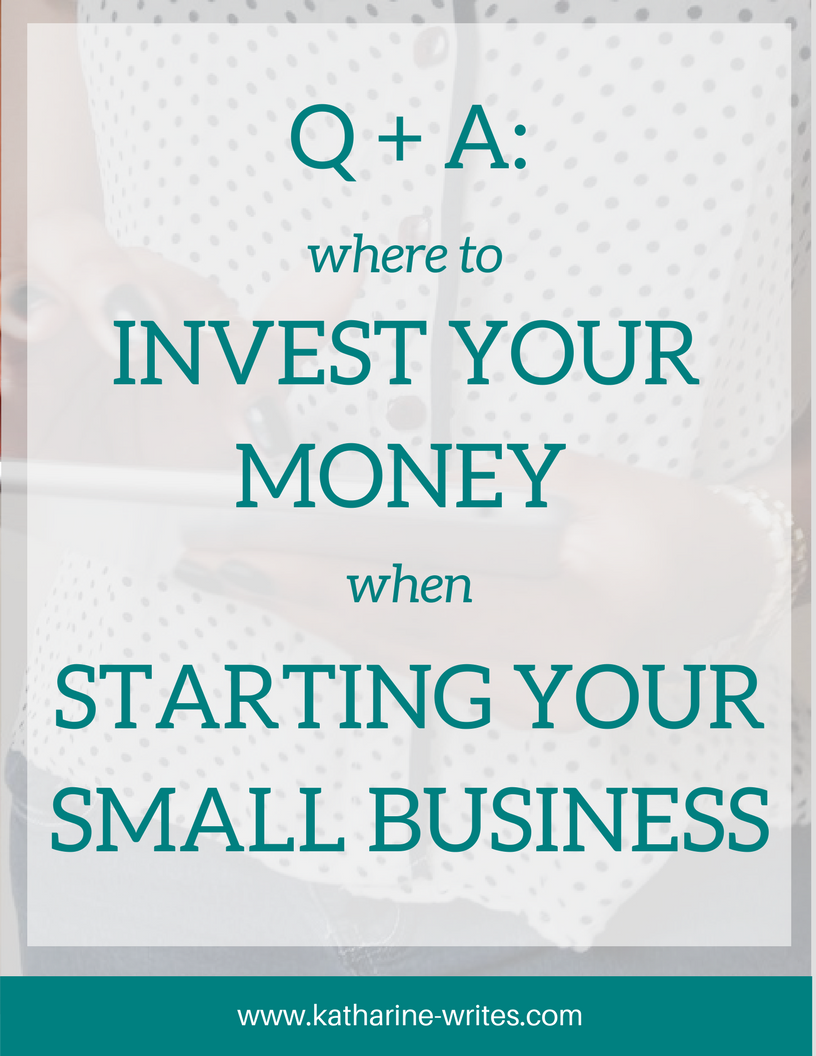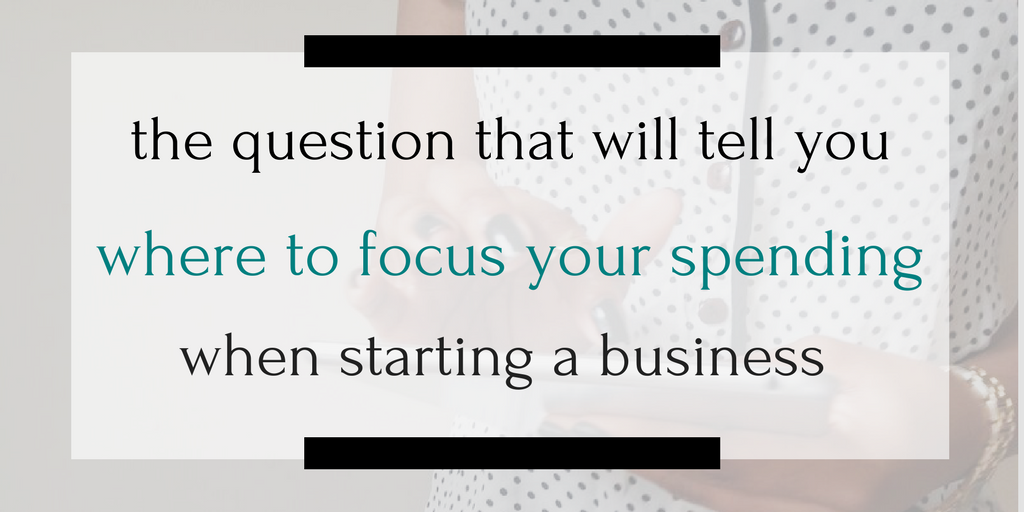
Where should you focus your spending when you first start your small business?
Saying that’s a hard question to answer is like saying Mount Everest is tall. There are few things small business owners are more aware of than how they are spending their (limited) budgets.
Depending on your business, of course, part of the answer might feel obvious. If you sell men’s socks, a big portion of your initial spending needs to go towards purchasing men’s socks (or purchasing the supplies to make men’s socks). If you’re opening a bookstore, your budget needs to go towards buying books.
But what about the less obvious parts?
How much should you invest in all the different marketing options out there? What about buying PR services? Do you need to attend that big industry conference? Pay for a landline and voicemail? Purchase a private office outside your home?
Feeling overwhelmed yet? (I know I was when I got started!)
That’s already a significant list of choices to make, and it doesn’t even begin to scratch the surface of all the possible things you could spend your money on when you first launch your small business.
It gets even trickier when you look at the cost of things you could, technically, do yourself, especially if you’re on a tight budget (and what small business isn’t?).
But is DIY the best option? Or is it worth bringing in a professional, even if it costs a lot more?
So as a business owner, when it it worth paying for help — and when can you afford to save a little?

When Should You Do It Yourself… And When Is It Worth Calling in a Pro?
Let me tell you a quick story.
I remember being on the phone with my very first copywriting client — except she wasn’t a client yet.
She was looking for someone to write website copy for the brand new business she was launching, an event planning and concierge service in New York City. And like most people switching careers and launching a new venture, she was hesitant to commit to spending a large chunk of money.
It’s not that she thought my prices were unreasonable — after all, I’m pretty committed to keeping my services affordable for small business owners, since I know how hard they work and how much they need to get done on a limited budget! But she was just getting started and wanted to know that she was making the right investment by hiring me, rather than throwing a quick website together herself and putting that money elsewhere.
So she asked me, point blank, if I were her, would I hire me?
It sounds like a trick question, right? The obvious answer, the get-the-client, close-the-deal answer, was yes.
But like I said, I understood where she was coming from. And I wanted to make sure that my first client valued my services and felt good about our time working together.
So I told her honestly that I couldn’t answer that question, but I could ask her one of my own that might help her decision:
Where did she expect her clients to come from?
That is, was she expecting that most of her initial client base would come from word-of-mouth referrals in her personal network? Or did she expect that more people would find her business online, via search, and contact her from there to learn more and book her services?
She thought about it for (the longest) two minutes (this was potentially my first client, after all, I was on pins and needles waiting for her answer!).
And she said that while she hoped eventually to grow to the point where most of her business came from word-of-mouth and PR coverage, realistically her first year or two of business would probably be from people finding her online.
In that case, I advised her, whether you hire me or not, you should invest in professionally written website copy. If your clients are going to find you online, they need to be able to search and turn up your website. That means well-written website content that’s optimized for search.
Psst — starting a small business is hard. That’s why I got six small business owners to dish on what they wish they’d known when they started out. You’ll find the whole scoop in my free resource library, right here:
The Question Small Business Owners Need to Ask Before Spending Money
Now, this isn’t a story about how I landed my first client (though that’s what happened, because people value real help more than a sales pitch).
It’s about that question: Where do you expect your clients to come from?
When you launch your small business, thinking about where your customers are going to find you and how your business is going to grow will help you answer most of your questions about spending, from outsourcing work to educating yourself.
Considering what will help your business grow will tell you when you should invest in professional help… and when you can get away with a little DIY.
Will most people find you online?
Then you need to invest in a killer website, professionally written editorial SEO so you are optimized for search, and serious content marketing.
Will you grow your network through networking and face to face contacts?
Then your website can be a little simpler (1-2 pages to start) but your marketing materials need to be amazing.
Will you be selling physical products?
Invest in inventory, of course, but also in display and shipping materials that will brand your business and sell your image.
Or are your services intangible?
You’ll probably need that awesome website and the training or education to establish your qualifications.
Will you meet face to face with clients?
You likely need a home office or studio space that is professionally set up and doesn’t just look like your living room.
Are there lots of moving parts in your business to keep track of, such as marketing, workshops, customer service, or travel?
It’s probably worth investing in the services of an in-person or virtual assistant so you don’t get bogged down and overwhelmed.
There are dozens of different forms that question can take, but it all comes back to the same basic principle:
Invest in what will help you grow your business, connect with customers, and project a professional image.
That being said, though, I know a list is sometimes really helpful. So here are a few things you probably need in some form, no matter what type of business you have. Some of them you may need to call in a pro to help put together… but there are probably a few you can do yourself too!
Remember, it all comes down to what will help your business grow and connect with new customers.
Things Every Small Business Should Invest In
1. Website and hosting
No matter what type of business you have — brick and mortar store, online-only consulting, or something in between — your customers will want to find you or information about you at some point.
Think of your website as your online home, your business card, and a marketing system all rolled into one.
How elaborate your website needs to be will depend on your business. Some people will need a full online store, blog, and multiple informative page. Other businesses might only need a single page with your basic information and a way to contact you.
Either way, though, you need a website that looks and reads professionally, and you need a place to host it.
2. Consistent visual marketing
This includes everything from your logo, fonts, and colors to the packaging on your shipping materials.
Keeping visuals consistent for your small business does three things.
First, the type of visual marketing you use sends a signal about your type of business, helping your customers understand what you do before you do or say anything.
Second, it creates a professional image, making your business look more reliable and more worth your customers’ investment.
And third, it creates a recognizable brand that your customers can develop a relationship with. Think about the ultimate example of consistent visual marketing, the little blue package from Tiffany & Co., and you’ll understand the power of recognizable visuals!
3. Accounting software
And, possibly, an accountant.
If you’re reading this, you understand the importance of cash flow for your small business. Good accounting software, or the advice of a professional accountant, helps you keep track of your revenue and ouflow, shows you where you can afford to spend or scale back, and tells you what expenses have been worth the investment.
And then, of course, there’s that big, important thing many small business owners forget to plan for until it’s staring them in the face: taxes.
From estimated payments to business expenses to profits and losses, taxes involve keeping track of many moving parts. And the consequences of getting things wrong can be disastrous for your business’s future. Do yourself a favor ahead of time and invest in accounting services.
4. Business plan
Knowing where your business is going and how you plan to get there is essential for growing and learning at any point, but especially when you are just starting out.
For some people, this might not actually require an investment of money (though it will take an investment of time). But if you know you can’t get organized on your own, you need to hire help, whether that is in the form of a business coach or a personal assistant.
Want to go the do-it-yourself route? I’ve got a free template for creating your business plan in my resource library! You can get it here:
5. Education
When it comes to running a small business, your expertise is the key to success.
Whether that’s in the form of an professional conference to expand your industry knowledge, an online course to learn a new skill set, or even an ebook from Amazon to learn more about marketing, your knowledge is essential to the development of your small business.
Your business should never stop growing, and so you as a business owner should never stop learning.
Leave a Reply